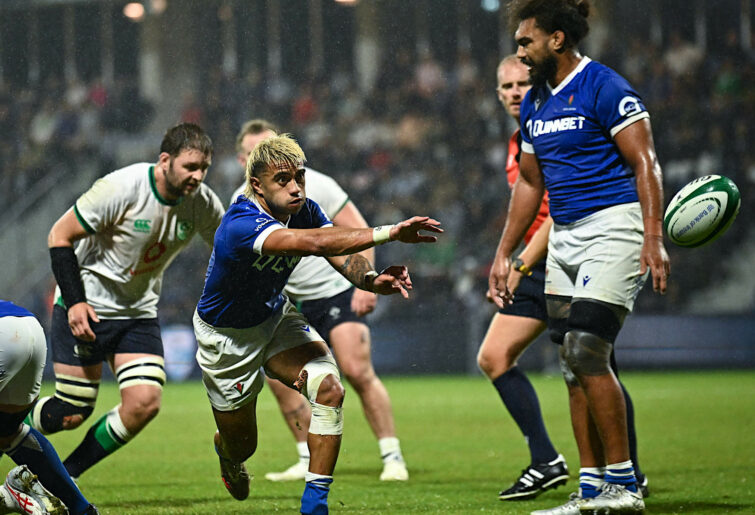From little things big things grow: when Rugby can mean so much to so many
I once wondered if I would ever see Ireland beat the All Blacks in my lifetime. My father never did.
The 2023 Rugby World Cup pool matches are finally over. While there were some exciting, hard-fought, and entertaining games, when looking at the results one thing in particular catches the eye: there are some extremely lopsided scores.
The Rugby World Cup needs to revert back to the old format of 16 teams. The current format is four teams too many. World rugby simply does not have the depth to have a 20-team World Cup.
Let’s have a look at the performance of the five ‘minnows’ ranked from best to worst:
Rank: 16
Lost to Wales 28-8
Drew with Georgia 18-18
Lost to Australia 34-14
Defeated Fiji 24-23
Conceded 103 points and scored 64 points.
Rank: 13
Lost to Australia 35-15
Drew with Portugal 18-18
Lost to Fiji 17-12
Lost to Wales 43-19
Conceded 113 points and scored 64 points.
Rank: 17
Lost to France 27-12
Lost to Italy 38-17
Beat Namibia 36-26
Lost to New Zealand 73-0
Conceded 164 points and scored 65 points.
Rank: 22
Lost to Japan 42-12
Lost to Samoa 43-10
Lost to England 71-0
Lost to Argentina 59-5
Conceded 215 points and scored only 27 points.
Rank: 21
Lost to Italy 52-8
Lost to New Zealand 71-3
Lost to France 96-0
Lost to Uruguay 36-26
Conceded a massive 255 points and scored just 37 points.
Ranked: 19
Lost to Ireland 82-8
Lost to South Africa 76-0
Lost to Scotland 84-0
Lost to Tonga 45-24
Conceded a whopping 287 points and scored a measly 32 points.
There is the argument that Portugal and Georgia should receive a pass mark because of Portugal’s one-point win over Fiji, their points difference, and that there were no blowout scores against them. Yet, they benefitted from both being in the same pool, Australia being so poor, and being in the weakest of the four pool groups.
Massively one-sided scores such as 96-0 (France v Namibia), 84-0 (Scotland v Romania), 73-0 (New Zealand v Uruguay), 71-0 (England v Chile), interest nobody – even most diehard French, Scottish, New Zealand, and English rugby fans. Blowouts don’t help the development of the team on the end of such a walloping, probably do more harm than good, and don’t do anything to help grow the game of rugby union worldwide – which is one of the main objectives of the Rugby World Cup.
If teams with World Rugby rankings of 17, 19, 21, and 22 are getting belted by more than 70, 80 or even 90 points, then there are too many teams and the disparity in levels is too great. Believe it or not, the World Rugby Rankings go all the way up to 109, with Indonesia, Monaco, Greece, Vanuatu and American Samoa rounding out the final five places. But rankings in the mid-20s and up seem dubious and frankly quite meaningless.
Future 16-team tournaments could consist of the top 12 ranked teams with four other teams qualifying. The current top 12: Ireland, South Africa, France, New Zealand, Scotland, England, Wales, Fiji, Argentina, Australia, Italy, and Japan. The other four spots could be decided by a ten-team round-robin tournament with all teams playing each other once. The four teams with the highest points qualify. This playoff tournament could consist of the next 8 ranked countries, currently Georgia, Samoa, Tonga, Portugal, Uruguay, USA, Romania, and Spain, with two other teams participating via qualifying.

Samoa’s Jonathan Taumateine. (Photo By Harry Murphy/Sportsfile via Getty Images)
With the current 20-team World Cup, there are five teams in each group, which means each team has a bye during the tournament. This is hardly ideal and raises questions of fairness in advantaging or disadvantaging one team over another depending on the timing of the bye.
Rugby just does not have the depth that football has for the FIFA World Cup, where a top-five-ranked team playing a country ranked lower usually results in a win for the favourite, but sometimes in an upset win for the underdog. For example in the 2022 Qatar World Cup, eventual Lionel Messi-captained World Cup champions Argentina (ranked No.3) lost 2-1 to Saudi Arabia (No.51) in the opening game of their group, Belgium (No.2) lost 2-0 to Morocco (No.22), Portugal (No.9) with Cristiano Ronaldo lost 2-1 to South Korea(No.28), and Brazil (No.1) lost 1-0 to Cameroon(No.43), to name just a few upsets in the group stages.
In this Rugby World Cup, the only team that was victorious against a higher-ranked opponent in any of the 40 pool matches was in last night’s final pool match where Portugal narrowly defeated Fiji 24-23. Since the expansion in 1999 from 16 to 20 teams, after seven World Cups, aside from Portugal’s win last night there have only been two other significant upsets: when an Eddie Jones-coached Japan was victorious against South Africa 34-32 in 2015 and in 2007 when Fiji defeated Wales 38-34.
Most rugby fans will disagree that there are too many teams in the World Cup, and that the so-called ‘minnows’ will eventually catch up to the tier one nations, but we’ve had a 20-team rugby World Cup since 1999 and we are still seeing huge one-sided scores.
An international rugby match where there is a 70, 80 or even 90 or more points difference between the teams is a waste of everyone’s time.